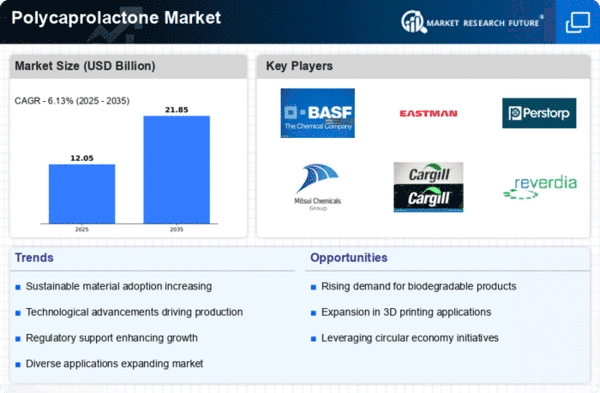Top Industry Leaders in the Polycaprolactone Market
 The polycaprolactone (PCL) market, fueled by its versatility and unique properties. This bio-based and biodegradable polymer is making waves across diverse industries, creating a dynamic and fiercely competitive landscape. Let's explore the key players, strategies, and trends shaping this exciting market.
The polycaprolactone (PCL) market, fueled by its versatility and unique properties. This bio-based and biodegradable polymer is making waves across diverse industries, creating a dynamic and fiercely competitive landscape. Let's explore the key players, strategies, and trends shaping this exciting market.
Polycaprolactone Players:
A diverse range of players, from global giants to nimble niche players, are vying for market share in this dynamic arena:
-
Global Goliaths: Leading chemical companies like Evonik Industries, BASF, and CJ Corporation leverage their extensive production capacities and research capabilities to dominate the market. -
Regional Champions: Players like Zhejiang Jihua Chemical Co., Ltd. and Zhejiang Tiantu Group Co., Ltd. hold strong regional footholds, catering to specific needs and regulations within their markets. -
Sustainability Advocates: Companies like NatureWorks and Boomo Chemicals champion bio-based PCL production, addressing growing environmental concerns and aligning with sustainability goals. -
Niche Specialists: Players like Corbion and Perstorp focus on specific PCL applications like biomedical devices and 3D printing filaments, offering high-performance and customized solutions.
Strategic Maneuvers: How Players are Winning the Game
To grab a larger slice of the PCL pie, players are deploying a range of strategies:
-
Innovation Arsenal: Continuous research and development into new PCL grades with enhanced properties, including improved biodegradability, fire resistance, and mechanical strength, is crucial for unlocking new applications and staying ahead of the curve. -
Sustainability Savvy: Embracing bio-based feedstocks and developing fully biodegradable PCL offerings caters to the growing demand for green alternatives and regulatory compliance. -
Diversification Drive: Expanding into new application areas like electronics, cosmetics, and agriculture opens up new market opportunities and reduces reliance on traditional segments. -
Partnerships and Collaborations: Strategic alliances with research institutions, manufacturers, and distributors fosters innovation, strengthens supply chains, and expands market reach. -
Cost-Effectiveness Equation: Balancing functionality, sustainability, and affordability is key to winning over price-sensitive customers in various industries.
Market Share Magnets
Several factors influence market share in this dynamic ecosystem:
-
Product Portfolio and Innovation: Offering a diverse range of PCL grades with tailored properties for specific applications and industries attracts more customers and opens up new market segments. -
Sustainability Credentials: Companies with a strong commitment to bio-based feedstocks, closed-loop systems, and biodegradable PCL options resonate with environmentally conscious consumers and regulatory bodies. -
Production Capacity and Efficiency: Owning the supply chain, optimizing production processes, and ensuring consistent quality are crucial for meeting global demand and securing partnerships with major manufacturers. -
Regional Footprint and Regulatory Compliance: Understanding local regulations, establishing local production facilities, and tailoring offerings to regional needs are essential for success in diverse markets. -
Technical Expertise and Customer Support: Providing comprehensive technical support, customized solutions, and application-specific assistance builds trust and fosters long-term customer relationships.
Key Players
- Perstorp Holding AB (Sweden),
- Daicel Corporation (Japan),
- Shenzhen Esun Industrial Co., Ltd (China),
- Corbion (the Netherlands),
- BASF SE (Germany),
- Merck KGaA (Germany),
- Polysciences, Inc. (US),
- Haihang Group (China),
- Shenzhen Polymtek Biomaterial Co., Ltd (China)
- Durect Corporation (US).
Recent Developments
-
October 2023: NatureWorks partners with a leading footwear manufacturer to launch a collection of shoes using bio-based PCL, promoting sustainability in the fashion industry. -
December 2023: BASF introduces a novel PCL composite material with self-healing properties, revolutionizing applications in fields like aerospace and automotive.










